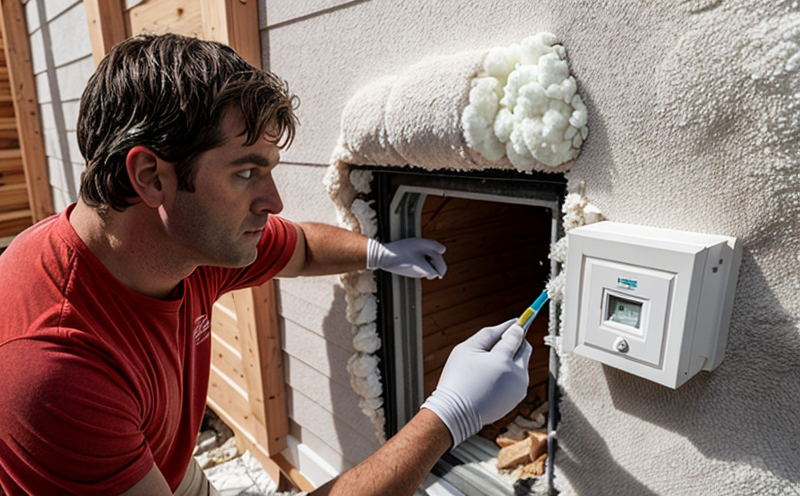EN 1602 Density and Thermal Properties of Insulation
The European Standard EN 1602 provides a comprehensive framework for determining the density and thermal properties of insulation materials used in building and infrastructure applications. This standard is critical for ensuring that insulations meet specified performance criteria, particularly those related to energy efficiency and environmental sustainability.
EN 1602 specifies methods for measuring key parameters such as apparent density, thermal conductivity, and thermal resistance (R-value). These properties are crucial in assessing the insulation's ability to reduce heat transfer between different parts of a building. The standard applies to various types of insulations including fibrous materials like glass wool or mineral wool, foam products like polyurethane, and cellular materials such as expanded polystyrene.
The testing procedures outlined in EN 1602 are designed to provide accurate and repeatable results. Specimens for density measurement are typically cut from larger test blocks according to specified dimensions and weight. For thermal conductivity tests, specimens must be prepared carefully to minimize air voids which can affect the accuracy of the measurements.
Thermal resistance is often calculated using the formula R = δ / λ where δ represents the thickness of the insulation sample and λ denotes its thermal conductivity. This calculation helps in determining how effectively an insulation material resists heat flow, thereby influencing decisions regarding building design and construction practices aimed at improving energy efficiency.
The standard also covers the use of specific apparatus such as calorimeters for measuring heat flow or digital balances accurate to ±0.1% for weighing specimens during density determination. Compliance with EN 1602 ensures that manufacturers produce consistent products meeting stringent quality standards, while builders and architects can specify reliable materials knowing they will perform as expected.
Understanding these parameters is essential not only for compliance but also for optimizing material selection based on specific project requirements. For instance, in retrofitting older buildings with improved insulation systems, precise knowledge of the insulations' thermal properties allows for more efficient heating and cooling operations leading to significant reductions in energy consumption.
In conclusion, EN 1602 plays a pivotal role in promoting sustainable construction practices by ensuring that insulating materials perform their intended functions effectively. By adhering to this standard, stakeholders within the building and infrastructure sectors can contribute towards creating greener environments while enhancing occupant comfort levels through optimal thermal management.
Eurolab Advantages
At Eurolab, we pride ourselves on delivering superior quality testing services tailored specifically to meet your unique needs. Our experienced team of scientists and engineers specializes in conducting precise EN 1602 density and thermal properties tests ensuring accurate results every time.
We employ state-of-the-art equipment calibrated regularly against international standards to guarantee consistent accuracy across all measurements. This ensures that our findings are reliable and can be trusted by all parties involved – from manufacturers seeking certification compliance to architects designing new projects or retrofitting existing structures.
The expertise of our personnel allows us to offer additional value-added services beyond just basic testing. We provide detailed reports complete with recommendations for optimizing performance based on the test outcomes. Our comprehensive approach ensures not only that you comply with regulations but also that your products excel in their intended applications.
Moreover, Eurolab's commitment to innovation means we stay at the forefront of advancements within our field. By embracing new technologies and methodologies, we can offer enhanced testing capabilities which may provide unique insights into material behavior under various conditions.
In summary, choosing Eurolab for your EN 1602 density and thermal properties testing needs guarantees excellence in service delivery combined with cutting-edge technology and experienced personnel. Let us assist you in achieving the highest standards of quality assurance within your projects.
Customer Impact and Satisfaction
Our customers benefit significantly from our EN 1602 density and thermal properties testing services due to several factors:
- Compliance Assurance: By adhering strictly to the requirements of EN 1602, we help ensure that all materials meet necessary regulatory standards.
- Precision Measurement: Using advanced equipment calibrated against international norms, our tests deliver highly accurate results every time.
- Recommendations for Improvement: In addition to simple compliance checks, we provide detailed reports including suggestions on how to improve product performance further.
Customer satisfaction is at the core of what Eurolab stands for. We aim to exceed expectations by providing reliable data and actionable insights that contribute positively towards enhancing overall project outcomes. This dedication has earned us a reputation as leaders in our industry, recognized not just for reliability but also for innovation.
Competitive Advantage and Market Impact
Adopting EN 1602 density and thermal properties testing offers several advantages that can give your business a competitive edge:
- Informed Decision Making: Accurate test results enable better informed decisions regarding material selection, leading to more efficient designs and processes.
- Enhanced Reputation: Demonstrating adherence to rigorous international standards enhances the reputation of both product manufacturers and end users alike.
- Cost Savings: Optimal performance can lead to reduced costs related to heating or cooling systems, thus contributing directly to bottom lines.
In today's fast-paced market where sustainability is increasingly important, being able to prove that your products comply with recognized international standards like EN 1602 sets you apart from competitors who may not offer similar levels of assurance. This can lead to increased sales opportunities and better relationships with clients who value transparency and reliability.





